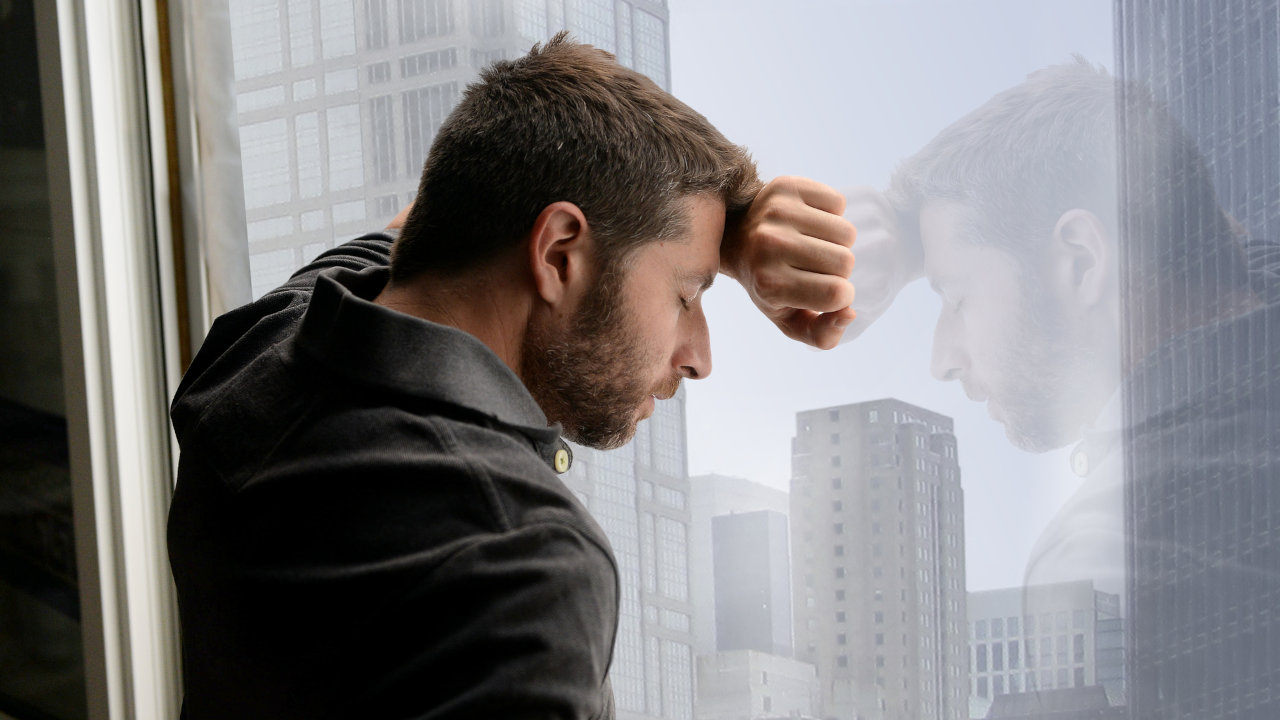Reading Time: 7 minutes

Depression is a severe mood disorder that’s characterized by negative emotions, low energy, and difficulty anticipating pleasure or happiness. Many depressed people feel sad, but for some, the dominant feelings are anxiety, irritability, emptiness, or guilt.
Some depressed people sleep far too much, while some are restless and have persistent insomnia. Depression can manifest in many different ways in different people, but it always impacts the quality of life and interferes with daily functioning. An estimated 21 million U.S. adults will experience at least one major depressive episode each year. That’s more than 8% of the country’s population.
Depression is also very common among individuals who suffer from substance abuse disorder (SUD). Experiencing both at the same time is known as a co-occurring disorder, or dual diagnosis. For some people, depression is the reason they began using drugs or alcohol in the first place, but chronic drug or alcohol use can also cause depression. Research shows that up to 93% of people who have depression also have SUD.
No matter which problem came first, it’s important for an individual struggling with both depression and substance use disorder to receive dual diagnosis treatment to address both issues.
What Are the Signs and Symptoms of Depression?
If you or someone you love is depressed, then you may notice some of these signs:
- Persistent “empty,” sad, or anxious mood
- Feelings of worthlessness, guilt, or helplessness
- Irritability
- Feelings of pessimism or hopelessness
- Restlessness or trouble keeping still
- Low energy or fatigue
- Difficulty with concentration, memory, and decision-making
- Feeling sluggish
- Sleep difficulties such as insomnia, waking up too often or too early, or sleeping too late
- Lack of pleasure or loss of interest in activities, hobbies, or social events
- Changes in appetite or weight
- Unexplained aches and pains, cramps, headaches, or digestive problems
- Thoughts of death or suicide
You don’t have to experience every symptom on the list to be considered depressed. Whether you are suffering from just a few or almost all of these signs, you may have some form of depression and could benefit from treatment.
Types of Depression
There are several different kinds of depression. Understanding how each one operates and what to expect is crucial to making sure you get the right kind of support.
Major Depression
This is severe depression that impacts an individual’s ability to eat, sleep, work, study, socialize, take care of themselves, and enjoy life. Major depression severely impairs functioning for months or years at a time, and tends to be chronic and recur in multiple episodes.
Persistent Depressive Disorder
This is depression that persists for at least two years. It often features ups and downs, and some episodes of severe depression alternate with episodes with milder symptoms.
Postpartum Depression
This is a type of severe depression induced by hormonal changes combined with the physical and emotional challenges of giving birth and caring for a newborn.
Seasonal Affective Disorder
This kind of depression occurs in the winter months and can sometimes be improved with light therapy.
Psychotic Depression
This type of depression is accompanied by psychotic symptoms such as delusions or hallucinations.
Depression can also include high levels of anxiety and even panic attacks. While episodes of major depression can make someone temporarily unable to function in daily life, some people suffer from what’s known as “subsyndromal” depression, meaning they experience just a few depressive symptoms that negatively impact their quality of life, but continue functioning somewhat normally.
Risks of Depression
Some Americans will only experience a single depressive episode in a lifetime, but for many, depression is a chronic, recurring disorder, with episodes lasting month, or even years.
Untreated depression not only takes a toll on the quality of life for both the individual and everyone who cares about them, but it is also associated with many serious risks.
Risks associated with depression include:
- Pain or physical illness
- Unhealthy weight gain or loss
- Drug and alcohol misuse
- Family and relationship problems
- Social phobias
- Anxiety and panic disorder
- Social isolation
- Self-mutilation
- Difficulties at work or school
Depression can also lead to premature death or suicide.
Premature Death
Depression impacts physical health in several ways. Stress has many proven adverse health effects, and these will naturally be exacerbated by the poor self-care found in most depressed individuals. The fatigue and hopelessness of depression will also keep many individuals from seeking needed medical care or fully following through on treatment regimens or lifestyle changes required to cure or manage any other disease they may have.
The misuse of alcohol and drugs associated with depression can contribute to premature death. One study even found that people who suffer from depression or anxiety may die around eight years earlier than people without these conditions.
Suicide
Severe depression often leads to suicidal thoughts and suicide attempts. People who misuse drugs or alcohol are more likely to be suicidal, putting anyone with a dual diagnosis of depression and substance use disorder at a greatly magnified risk of suicide. Studies show that the risk of suicide is nearly six times higher for people with alcohol use disorder (AUD), and more than eight times higher for people who struggle with drug and alcohol addiction.
How Does Depression Interact with Addiction?
In one recent study, depression was found to be the most prevalent mood disorder among participants who also had a specific drug use disorder. In the sample, around 29 to 60% of individuals experienced both simultaneously.
The considerable overlap between depression and addiction indicates a massive need for coordinated treatment plans that target both issues at the same time.
Consider the example of someone who struggles with both alcohol and depression. If they are treated for alcohol use disorder but not depression, their depressive disorder could make them likely to start drinking again. Conversely, if they are treated for depression but not alcohol use disorder, any improvements in mood and functioning will be short-lived, as excessive drinking may cause their depression to return.
What Causes Depression?
Depression is most often caused by a combination of different factors that can be biological, genetic, psychological, or environmental.
People facing serious illnesses such as cancer, diabetes, or Parkinson’s disease often deal with depression. Sometimes this is psychological, due to the severity of the disease, but sometimes depression is a side effect of medications or treatments prescribed to treat the disease.
Other risk factors for depression include:
- Family history of depression
- Trauma
- Sleep deprivation
- Major life changes
- Chronic stress
It should be noted that all the factors with the potential to cause depression also have the potential to lead to substance use disorder. This is because difficulties in life can lead some individuals to self-medicate, trying to soothe negative mental and physical states with addictive substances. These common factors are also why a dual diagnosis of depression and addiction must be treated comprehensively, with careful attention paid to all aspects of each problem.
How are Depression and Addiction Treated?
There is a significant treatment gap in the United States today, with far too many people struggling with substance use disorders not getting treatment.
The combination of alcohol and depression is a significant problem in the United States, especially when it comes to treatment, or the lack thereof. One report revealed that up to 84% of people who deal with depression do not seek the help they need.
The good news is that both depression and substance use disorder can be effectively treated if an individual seeks professional help. Furthermore, many of the same treatments that work for depression also work for substance use disorder, as long as the counselors, therapists, and patients tailor the approach to address the various issues unique to both sides of the dual diagnosis.
People suffering from depression and addiction will get the necessary comprehensive treatment at a rehab facility that specializes in dual diagnosis. This may be an inpatient program, where the patient lives full-time at the treatment facility, or an outpatient program that allows the patient to continue living at home while receiving treatment. The ideal recovery plan should take a “step-down” approach to dual diagnosis recovery that starts with inpatient care, then moves to outpatient care, and then to aftercare. Medications, such as Zoloft, can be prescribed to help treat symptoms of both conditions.
Aftercare helps people in recovery stay healthy in various ways. They can attend alumni events at their treatment center, check in periodically with counselors, or attend peer support group meetings. Services that help patients find stable housing, vocational training, or employment are also a big help, allowing people in recovery to become more independent. A successful long-term recovery is only possible with self-awareness, self-reliance, and self-care.
Cognitive Behavioral Therapy
Cognitive Behavioral Therapy, or CBT, is one of the most effective treatments for both depression and addiction. CBT for depression usually starts by helping the patient identify negative thought patterns and false beliefs that are prolonging depressive symptoms. Then, therapists show the client how to replace the negativity and falsehoods with healthier, more realistic ideas.
Over time, switching from a negative thought to a positive one turns from a deliberate effort into a habit, and depressive symptoms gradually improve. CBT helps patients learn healthy coping mechanisms that will allow them to effectively deal with life stressors and conflicts so that depressive episodes do not recur. It also guides patients towards a shift in perception that allows them to interpret life events and environments more positively.
CBT for addiction usually begins with helping the patient identify thoughts, situations, emotions, and environments that trigger substance use. Then the patient learns how to avoid the triggers that can be avoided and healthier responses for those triggers that cannot be avoided. Therapists also teach everyday coping techniques to help clients effectively deal with the ups and downs of life without turning to substances, as well as shifts in perception so that things that would once be labeled as negative can be reinterpreted in a more positive light.
Depression and addiction are often interlinked, and treating both with a comprehensive recovery plan is a great way to step out of the darkness and into the healthy, bright life you deserve.

